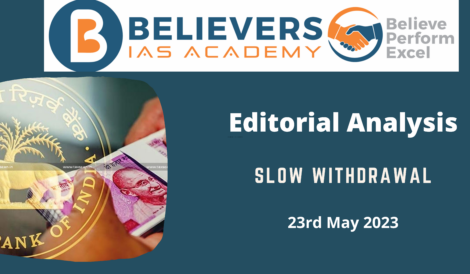Right to Information
Context:
A response to a query under the Right to Information Act has revealed that Indian Railways touched earnings of ₹1,229.85 crore from cancelled waiting list tickets between 2021 and 2024 (till January).
Relevance:
GS-02 GS-04 (Right to Information, Transparency & Accountability)
Right to Information:
- The inception of the RTI law traces back to 1986. It originates from a Supreme Court ruling in the case of Mr. Kulwal v/s Jaipur Municipal Corporation.
- The court ruled that the freedom of speech and expression enshrined in Article 19 of the Constitution inherently encompasses the Right to Information.
- It emphasized that citizens cannot fully exercise their freedom of speech and expression without access to information.
- The objective of the Act is to empower citizens, promote transparency and accountability, contain corruption and enhance people’s participation in the democratic process.
- It allows every individual to seek and receive information related to any issue regardless of the boundaries.
- It is a fundamental right enshrined in article 19(1) of Part 3 of the Indian Constitution.
Features of RTI act:
- Any citizen of India may request information from a public authority. The required information needs to be replied to within 30 days.
- The request for information is required to be submitted to the Public Information officer at the centre or in the State.
- It enables every government body to make their offices transparent by computerizing their records for the wide dissemination of the information to the public.
- Jammu and Kashmir will not come under the RTI Act 2005. However, it has a separate 2009 Act.
- The restrictions imposed by the Official Secrets Act 1923 were relaxed by this act.
- Enforcement process:
- The Act has established a three-tier structure for enforcing the right to information guaranteed under the Act they are – Public Information Officer, First Appellate Authority, and Central Information Commission (CIC).
- In case of non-receipt of information within 30 days, the individual requiring information may file an appeal. The Appellate Authority must reply within 30 days or in 45 days in exceptional cases.
- The individual may file 2nd appeal within 90 days in case of non-supply of information.
- The public authorities applicable under the RTI act are all Constitutional bodies at centre and state (Legislature, Executive, Judiciary), bodies/NGOs owned/financed by the government, and privatized public utility companies.
- Section 8: deals with public authorities which have been granted an exemption under this act
- The public authorities excluded under RTI are agencies of the state specified through notification, Central Intelligence and Security Agencies.
- Composition and tenure:
- The Central Information Commission shall consist of one Chief Information Commissioner and up to 10 Central Information Commissioners.
- The Chief Information Commissioner will have a term of five years from the date of entering his office. She/ He shall not be entitled to reappointment to that post.
Significance of RTI:
- It strengthens participatory democracy as it empowers people to demand and get the information they intend to.
- It keeps the government records always open to public scrutiny. For instance, the recent electoral bond case was filed with a pretext of a RTI filed seeking information of the source and destination of the huge corpus of money.
- It keeps the checks and balances of the offices under the government and ensures that they change their attitude towards the duty they are bound to perform.
Challenges:
- Various types of information are frequently requested through RTI, some of which lack public interest and may even be exploited to misuse the law, leading to harassment of public authorities.
- Despite its intended purpose, the effectiveness of RTI is hindered by factors such as widespread illiteracy and lack of awareness among the majority of the population.
- Additionally, while RTI primarily aims to facilitate access to information rather than serve as a grievance redressal mechanism, the issuance of notices by Information Commissions often compels public authorities to address grievances raised through the RTI process.
Facts for Prelims:
- Raj Narayan vs Uttar Pradesh State case: The Supreme Court ruled that the right to information is a fundamental right, and it is the citizen’s right to know about the workings of the government.




